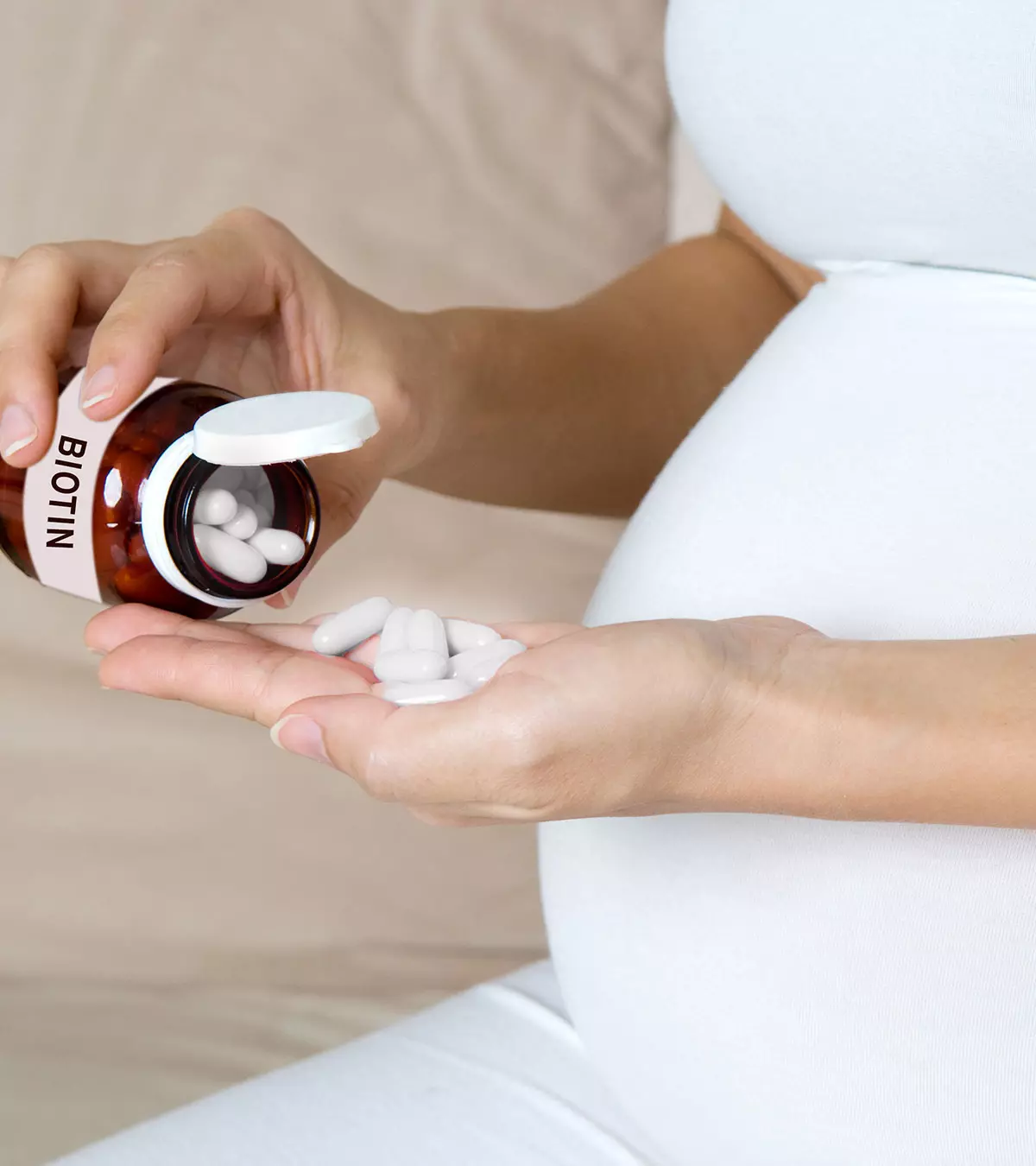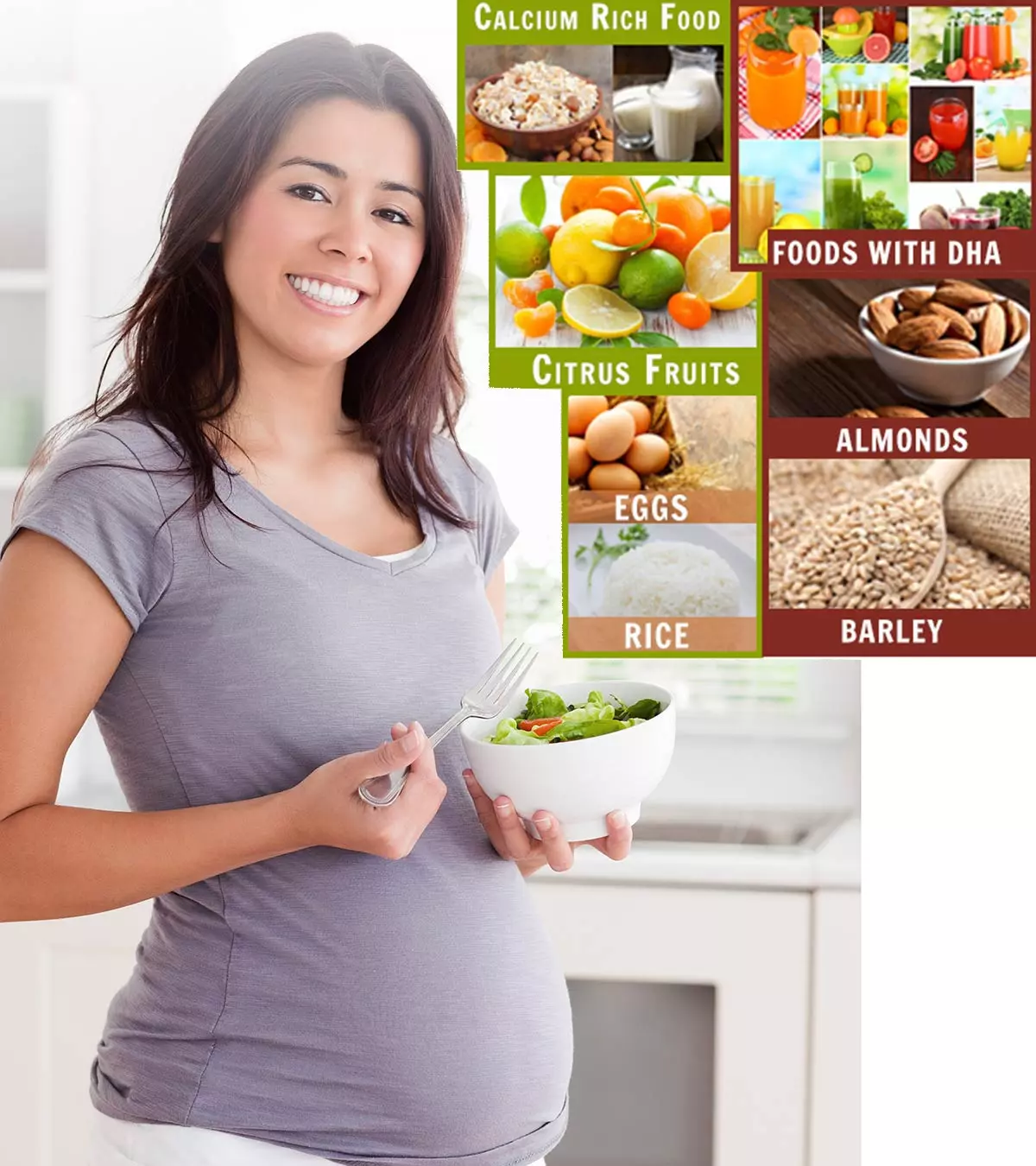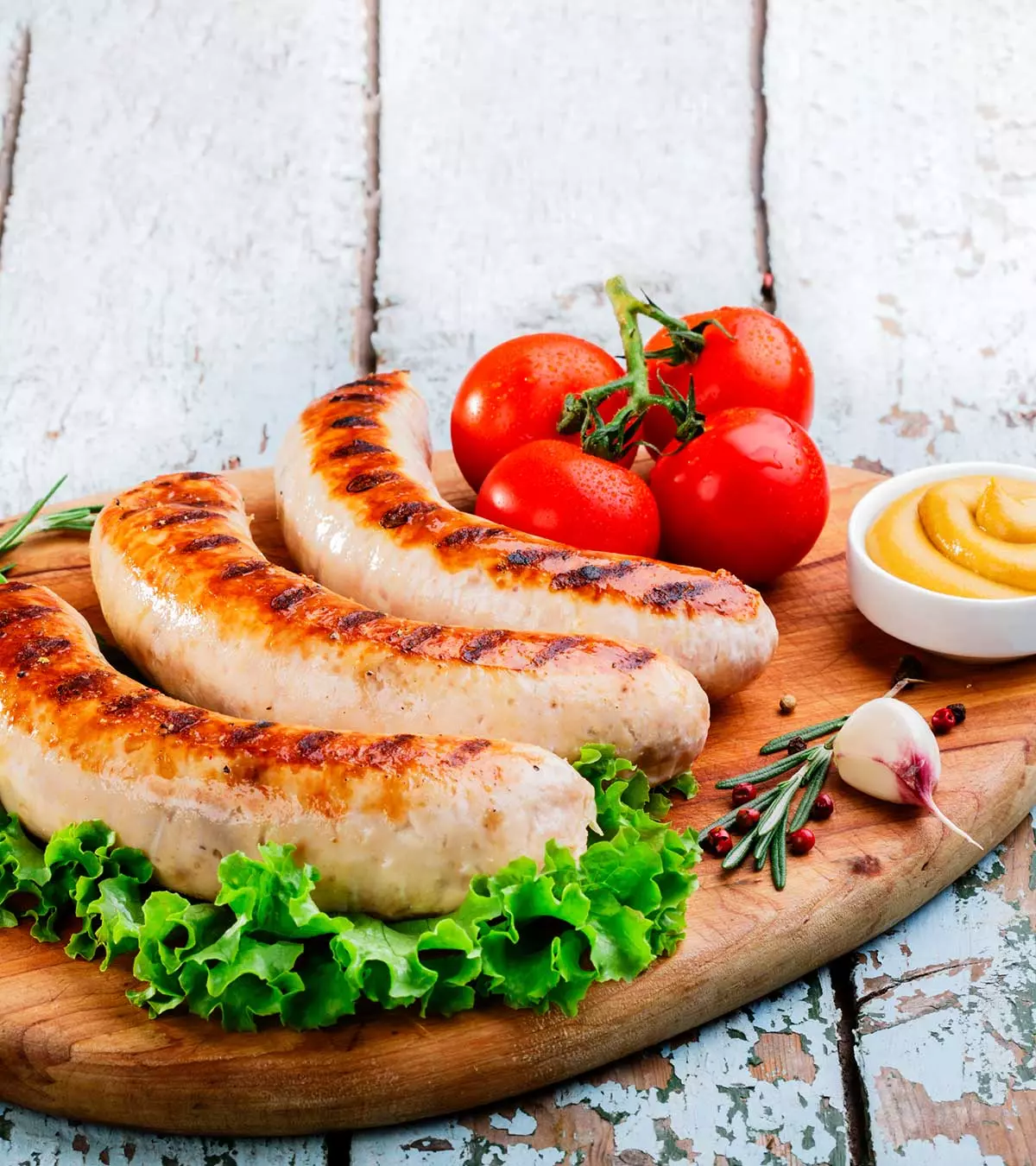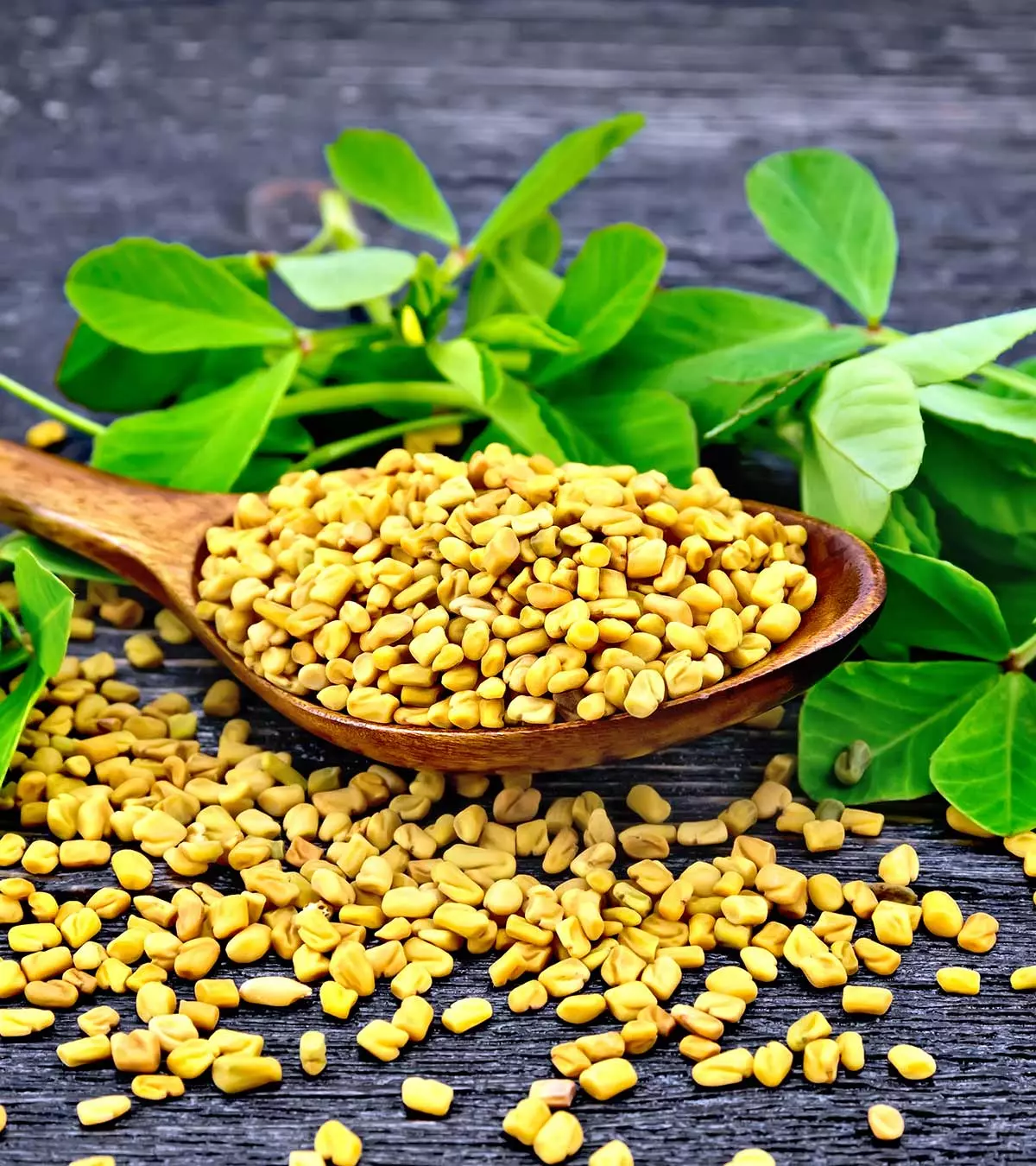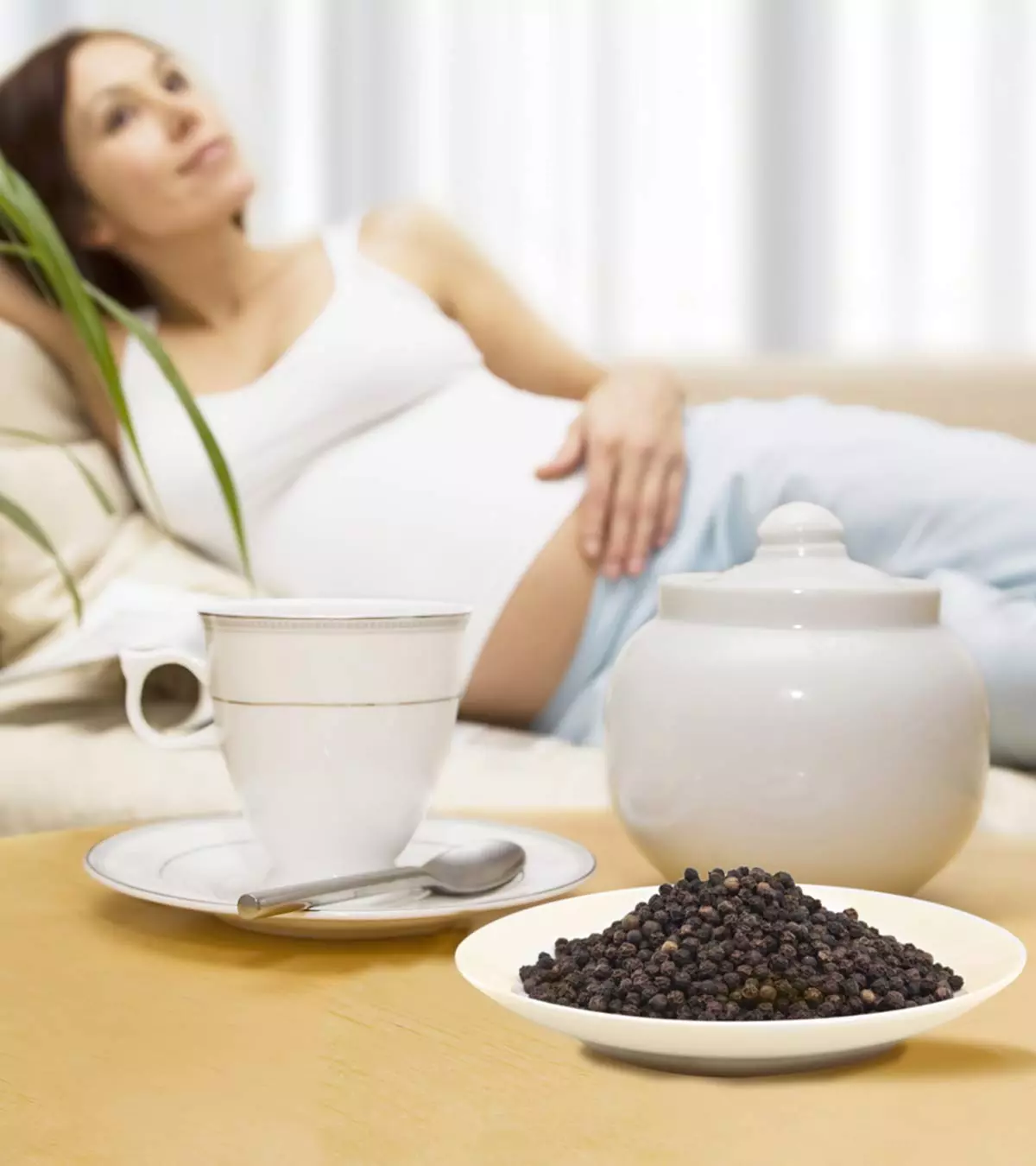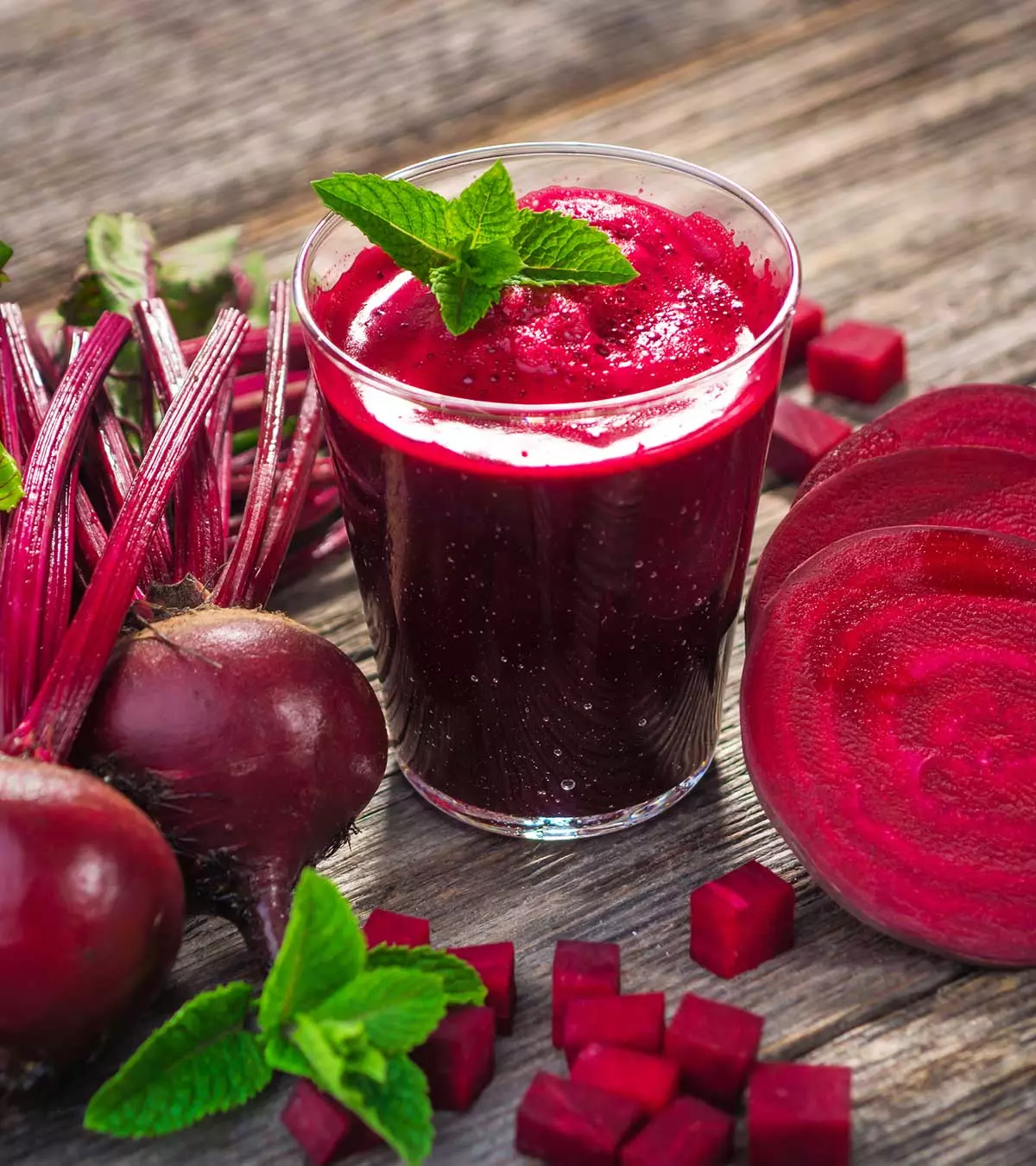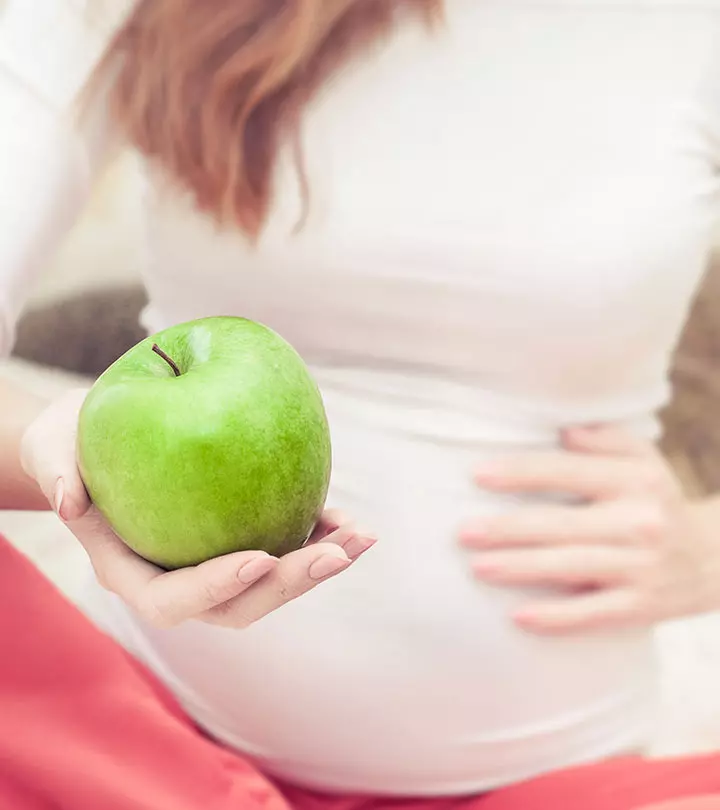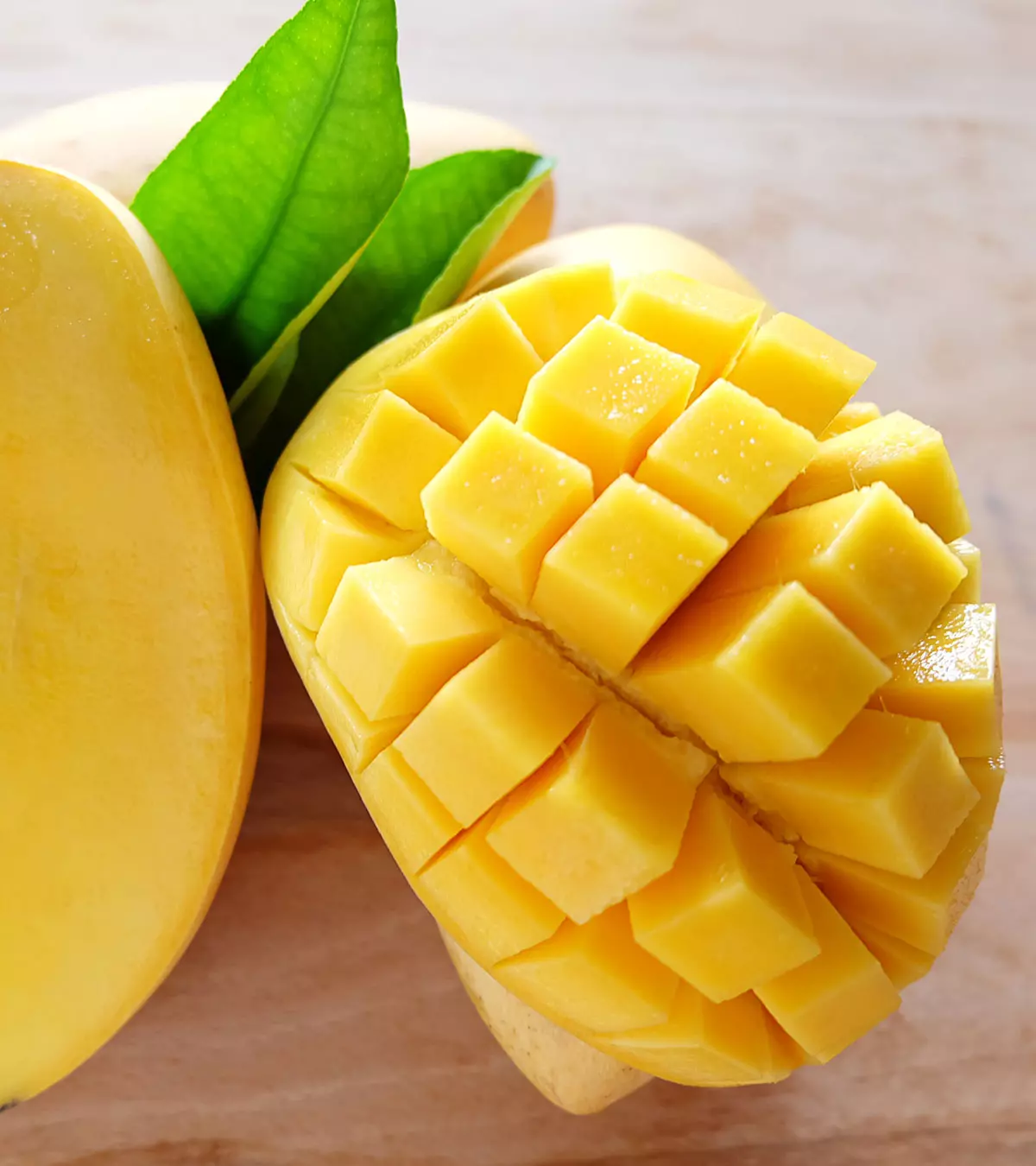
Image: Shutterstock
We all eagerly wait for the king of fruits to hit the summer market. Mangoes are juicy and delicious fruits loved by all. However, although you may love the sour and tangy raw mangoes as much as the sweet-ripe ones, you may be concerned about the safety of eating mangoes during pregnancy. Mangoes are packed with several nutrients and minerals, but are they good for your growing baby? Read this post to know how much of this fruit is safe in pregnant women, its health benefits, and possible side effects.

Key Pointers
- Consuming mangoes during pregnancy provides one with essential nutrients and antioxidants.
- It is advised not to consume more than one mango a day during pregnancy to avoid complications related to gestational diabetes.
- Mangoes also help develop the fetus’s nervous system and brain.
- To avoid the risk of toxin contamination, it is advised to purchase raw mangoes from the market and ripen them at home.
- Consult your healthcare professional about any questions about consuming mangoes during pregnancy.
Is It Safe To Eat Mango During Pregnancy?
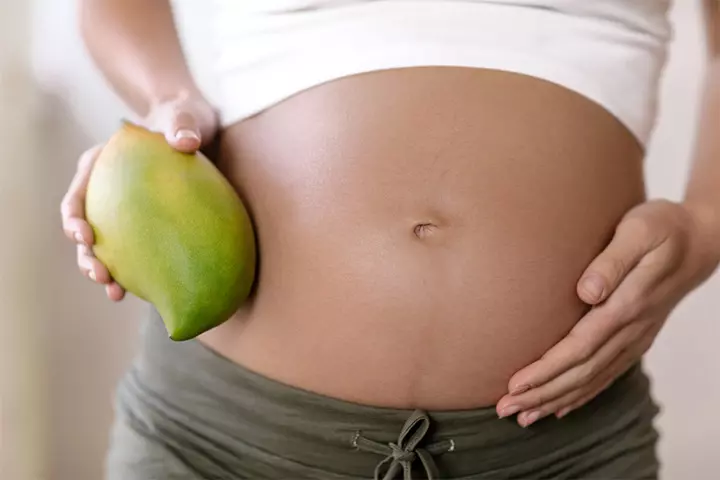
Yes, you can eat mangoes in pregnancy as they are an excellent source of energy, antioxidants and vital nutrients (1). But it is important to monitor the portions and avoid overindulgence. Mangoes are seasonal fruits and should be consumed at a time when they are naturally available.
In any case, consult your doctor before including the fruit in your diet.
How Many Mangoes Can You Consume When Pregnant?
It is best to consume no more than one mango a day. Also, include mangoes only if your doctor asks you to increase your calorie intake. A 100g serving of mango contains about 15g sugar (2), which makes excessive mango consumption during pregnancy a bad idea, especially if you have issues with gestational diabetesiA type of diabetes that occurs during pregnancy .
Besides sugar, mangoes have several other nutrients that make it a safe food for pregnant women.
Nutritional Value Of Mango
Mangoes are a superfruit rich in nutrition and flavor. It may either be consumed by itself or in conjunction with other fruits to obtain its full benefits. Here is the nutrition breakdown of a 100-gram serving of ripe mangoes (2):
| NUTRIENT | AMOUNT |
|---|---|
| Calories | 60kcal |
| Protein | 0.71g |
| Fiber | 2.1g |
| Sugar | 15g |
| Vitamins | |
| Vitamin C | 30mg |
| Vitamin A | 714IU |
| Minerals | |
| Calcium | 14mg |
| Iron | 1.93mg |
Mangoes also offer several benefits for pregnant women. Read on to know more about it.
What are the Health Benefits Of Eating Mango During Pregnancy?
Mangoes are a great addition to smoothies, salsa, salads, oatmeal, and yogurt. Consuming mangoes regularly, in raw, baked, or grilled form, can do wonders for your health and well-being. The following are the health benefits of consuming mangoes during pregnancy.
1. Iron prevents anemia
Mangoes are rich in vitamin C and help in the absorption of iron, which an expecting mother needs to overcome pregnancy-related-anemiaiA condition caused due to increased blood volume during pregnancy in which the body does not have sufficient red blood cells (3).
2. Folic acid aids fetal development
Mango is a great source of folic acid which is essential for the development of the fetal brain and spinal cord. Mango consumption prevents the neural tube neural tube defectsiSevere congenital abnormality (birth defect) of the neural tube that forms the baby's spine and brain at conception which can occur in early pregnancy (4).
 Did you know?
Did you know?3. Dietary fiber manages digestive health
The fiber content in mangoes helps you feel full for a longer duration. Mangoes also aid digestion and prevent constipation that women experience in the first trimester (5).
Dr. Carly Sedlacek, a registered dietician at Cleveland clinic says, “Mangoes take longer to digest than low-fiber foods. So, you’re less likely to notice a crash of fatigue and hunger that happens after you eat processed foods or foods that may not be as nutritionally dense, like chips or crackers. You feel fuller, longer, without having to consume a lot of calories. And you’re able to get some extra nutrients in the process (21)!”
4. Provides rich antioxidants
Vitamin C in mango acts as a powerful antioxidant that helps develop resistance against free radicals, which can disturb fetal development and even lead to cancers. Vitamin C can also lower the risk of premature birth (6).
5.Vitamin A for baby’s development

The vitamin A, abundantly found in mangoes, helps in the formation of baby’s teeth and bones. It is also essential for eye and immune system development and aids in the development of heart, lungs, and kidneys (7).
6. Vitamin B6 for fetal brain and nervous system
Mango is also a source of vitamin B6, which plays a role in the development of the fetal brain and nervous system (8) (9).
 Quick fact
Quick factMango is also a source of vitamin B6, which plays a role in the development of the fetal brain and nervous system (8) (9).
7. Magnesium prevents preeclampsia
Magnesium and potassium, present in reasonable amounts in mango, act as excellent natural remedies for preeclampsia and increased blood pressure, while the vitamin E in this fruit helps build fetal muscle and prevents preeclampsiaiA high blood pressure condition that occurs during pregnancy (10) (11) (21).
8. Beats morning sickness

The fresh taste of mango helps prevent morning sickness. Vitamin B6 in this fruit also plays a key role in relieving you from nausea and morning sickness (12).
9. Balances body fluids
As the blood volume increases during pregnancy, your body needs extra minerals. Mangoes contain electrolytes such as potassium, calcium, magnesium, and sodium that help in maintaining the fluid balance (13). Electrolytes ensure optimal heart health and make the brain, nerves, and the muscles work as they should.
Although mango offers numerous benefits, you need to be mindful of eating it while pregnant.
Are There Any Side Effects Of Mango During Pregnancy?
Consuming any food in excess has its repercussions. The side effects of consuming mangoes during pregnancy include –
- Diarrhea: Over consumption of mangoes can cause diarrhea, which can lead to dehydration (14). Dehydration during pregnancy is common and can be dealt with by keeping the diet and nutrition needs in check.
Juliana Tamayo, a registered dietitian from Washington, District of Columbia, says, “There are fermentable carbohydrates in mangoes that can cause sensitivity in some women. During pregnancy, some women might experience irritable bowel syndrome and other gastrointestinal issues that can cause indigestion, gas, and bloating. Nevertheless, mangoes are high in fiber and can keep your gut working regularly, while also helping feed the healthy bacteria.”
- Increased risk of gestational diabetes: Mango has high levels of sugars and can put you at a greater risk of diabetes mellitusiA group of metabolic diseases characterized by increased blood glucose (sugar) levels . Eating fewer mangoes, which have a medium Glycemic IndexiA value or a scale to classify foods based on their potential to impact blood glucose levels (GI), can help overcome the risk of gestational diabetes (15). The Centers For Disease Control And Prevention (CDC) reports that gestational diabetes annually impacts 2 to 10% of pregnancies in the US.
Tamayo adds, “Pregnant women who experience gestational diabetes should avoid eating too much mango and always pair the fruit with a source of protein. Also, they should avoid eating it in the mornings to prevent hyperglycemiaiA medical term used for high blood sugar (glucose) .”
- Excess weight gain: Mangoes are rich in carbohydrates and add to your already increasing pregnancy weight. So, consume them in moderation as part of a healthy eating plan.

- Allergic reactions: Some people can experience allergies when they come in contact with the fruit skin or the sap. If you experience the ‘mango itch’, avoid the fruit (16).
- Reactions from artificially ripened mangoes: Mangoes that have been artificially ripened can have an adverse effect on both the mother and the baby. These fruits are ripened using calcium carbide, a toxic substance that contains traces of arsenic and phosphorus.
Consumption of these mangoes could lead to mood swings, sleepiness, headaches, dizziness, confusion, seizuresiA sudden aberrant electrical activity in the brain , mouth ulcers and tingling in hands and feet (17). So only choose mangoes that have been naturally ripened.
How Will You Know If The Mango Is Ripened Naturally Or Artificially?
Artificially ripened mangoes show the following characteristics (22):
- Possess a black powdery or grayish-white coat
- Give out a garlic-like odor
- Look ripe but remain raw and hard inside
- Are tasteless and leave a peculiar aftertaste
- Have a shorter shelf-life and start to show black patches sooner
- Are soft to touch
Tips to Eat Mangoes Safely
It is not always easy to buy naturally ripened fruits. However, you can take measures to minimize the toxins you ingest by eating a mango that is not organic.
- Wash the fruit thoroughly: Washing the fruit before consumption helps get rid of any chemical residues. It also removes any contamination by the listeria bacteria from the soil.
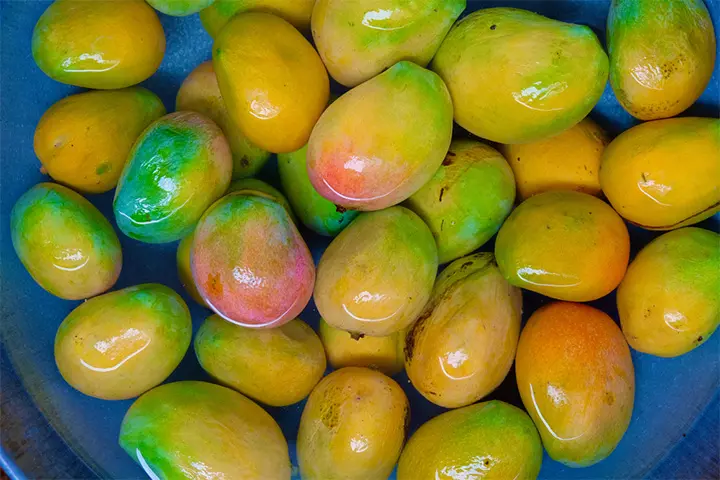
- Peel the fruit: Do not eat the skin as it contains a natural oil called urushiol, which can cause allergic rashes similar to those from poisoned ivy and oak. Peeling the mango skin after washing will also reduce toxin exposure (21). Dr. Sedlacek suggests, “Some people have an allergic reaction from touching mango skin, but others don’t react at all. If you get itchy hands when you peel mangoes, wear gloves to wash and peel them.”
- Maintain hygiene: Always clean the knives and chopping board before use, and wash your hands after getting in contact with the mangoes.
- Ripen the fruit at home: To keep toxins away, buy raw mangoes and ripen at home naturally. That eliminates the risk of calcium carbide contamination.
- Buy mangoes from trusted sources: It ensures they are naturally ripened and free from harmful chemicals.
There are some myths about the consumption of mangoes during pregnancy. “I recall a personal experience when I had a craving for mangoes during my pregnancy. There was a commonly held belief in my community that mangoes generate heat and could be harmful. But my doctor assured me it was alright, and moderation was key, shares Mahima Satvik, an Indian mother and writer (i).”
Which Mangoes Are Safe During Pregnancy – Ripe Or Raw?
Consuming ripe and raw mangoes during pregnancy is safe, provided you take them with caution. Ripe fruit offers natural sugars and is an excellent replacement for high-calorie desserts. Ripened mangoes stimulate appetite, aid digestion and improve your complexion.
The raw fruit is rich in vitamins and antioxidants, which help fight morning sickness and acidity, improve immunity, and keep the liver healthy.
Is It Safe To Eat Mango During The Third Trimester?
You can continue to eat mangoes during your final trimester but in smaller quantities. Excessive fruit intake around this time can cause gestational diabetes. Also, avoid mangoes during the final weeks of pregnancy if you have experienced any allergic reactions earlier.
To enjoy mangoes in moderation, consider this recipe.
Mango spinach pregnancy smoothie
This mango and spinach smoothie offers beta-carotene, essential minerals, and fiber. It helps you relax and also cools your tummy.
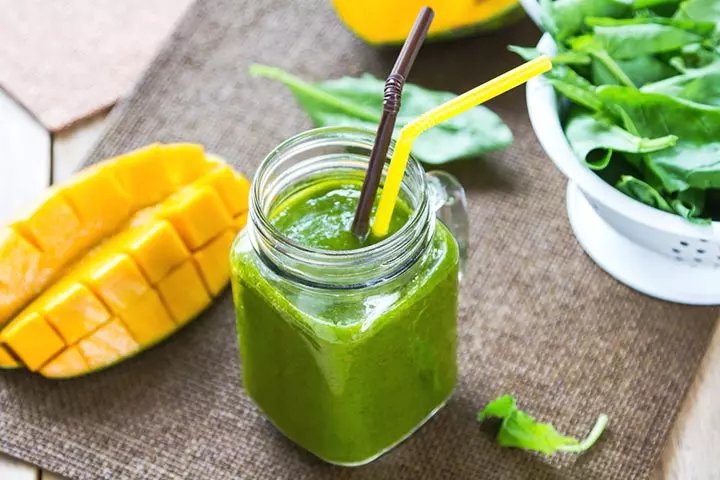
You will need:
- 1 ½ cup frozen mango, cubes
- 10oz orange juice
- ½ cup Greek yogurt
- 2 cups spinach
- 2 tbsp chia seeds
How to:
- Put all the ingredients in a blender.
- Blend them until you get a smooth mixture.
Preparation time –
5 min
Servings – 4
 Quick tip
Quick tipKeep reading if you have any more doubts about consuming mangoes during pregnancy.
Frequently Asked Questions
1. Can mango abort the pregnancy?
Excess intake of raw mango, which is one of the fruits that most pregnant women crave, is considered to increase heat in the body (18). It can trigger bleeding, especially in the third trimester, and thus lead to miscarriage.
2. Can I drink mango shake or juice during pregnancy?
Yes, you can have a mango milkshake or juice without any restrictions. But note that they are high in sugars and calories and should be taken in moderation.
3. Can I eat mango pickle during pregnancy?
You can consider eating mango pickle, but only occasionally.
4. Can I eat dry mango powder during pregnancy?
Yes, you can have dried mango powder (amchur) as it is high in iron. It also prevents acidity and improves skin tone and thus, skin health.
5. Which country’s mango is best in the world?
The Guinness Book of World Records indicates that mangoes grown in coastal regions of the Philippines are considered to be among the best in the world.
6. Are there other ways to eat mangoes during pregnancy?
Pregnant women can have mangoes in different ways, such as smoothies and salads. However, it’s important to eat them in moderation and talk to a healthcare provider for specific guidance.
7. What are some common myths about eating mangoes during pregnancy?
When it comes to eating mangoes during pregnancy, several myths often surface. For instance, many believe that mangoes cause heat in the body and should be avoided during pregnancy. Some also suggest that only unripe mangoes are safe for pregnant women. Eating mangoes in moderation as part of a balanced diet is fine, and mangoes, whether ripe or unripe, can provide nutrients that support the mother and the baby.
Mango is one of the best fruits to eat during pregnancy. Eating mangoes in pregnancy may provide you with various vitamins, minerals, and energy. Mangoes are rich sources of vitamin C, folic acid, vitamin A, and potassium and so, are good for maternal health. The fruit is also a good source of dietary fiber that prevents constipation. You may include mangoes into your diet to enhance the taste and flavor. Although mangoes are safe during pregnancy, you may limit their consumption or eat them in moderation since they contain sugar. Pregnant women with gestational diabetes or diabetes mellitus should seek their prenatal health care provider or doctors’ advice to learn more about consuming mangoes.
Infographic: Benefits Of Consuming Mangoes During Pregnancy
Mango is known as “the king of fruits” for a reason. No one can resist devouring its rich taste. But now that you are pregnant do you have doubts regarding its consumption? To clear your confusion, we shed light on how consuming mangoes helps both mother and baby during pregnancy. Read on! Illustration: Momjunction Design Team
Illustration: Proven Health Benefits Of Eating Mangoes In Pregnancy

Image: Dall·E/MomJunction Design Team
Personal Experience: Source
MomJunction articles include first-hand experiences to provide you with better insights through real-life narratives. Here are the sources of personal accounts referenced in this article.
i. Dissecting the myths of pregnancy and post-delivery.https://medium.com/@mahima.satvik/busting-the-bump-myths-the-truth-about-pregnancy-and-post-delivery-8923b9e5c496
References
- Eating during pregnancy.
https://www.open.edu/openlearncreate/mod/oucontent/view.php?id=316§ion=8.4.2 - Mango.
https://fdc.nal.usda.gov/fdc-app.html#/food-details/454102/nutrients - How to assess iron deficiency anemia and use the hemocue?
https://www.researchgate.net/publication/267378422_HOW_TO_ASSESS_IRON_DEFICIENCY_ANEMIA_AND_USE_THE_HEMOCUE - Kick off the New Year with Folic Acid!
https://www.ncbi.nlm.nih.gov/pmc/articles/PMC6770070/ - Kanjana Mahattanatawee et al.; (2006); Total Antioxidant Activity and Fiber Content of Select Florida-Grown Tropical Fruits.
https://www.ars.usda.gov/research/publications/publication/?seqNo115=190285 - Anna Maria Siega-Riz et al.; (2003); Vitamin C intake and the risk of preterm delivery.
https://pubmed.ncbi.nlm.nih.gov/14520228/ - Vitamin A.
https://lpi.oregonstate.edu/mic/vitamins/vitamin-A - Maldonado-Celis Maria E. et al.; (2019); Chemical Composition of Mango (Mangifera Indica L.) Fruit: Nutritional and Phytochemical Compounds.
https://pmc.ncbi.nlm.nih.gov/articles/PMC6807195/ - Natural Sources of Vitamin B During Pregnancy.
https://americanpregnancy.org/healthy-pregnancy/pregnancy-health-wellness/natural-sources-of-vitamin-b-during-pregnancy/ - Elaheh Zarean and Amal Tarjan; (2017); Effect of Magnesium Supplement on Pregnancy Outcomes: A Randomized Control Trial.
https://www.ncbi.nlm.nih.gov/pmc/articles/PMC5590399/ - Vitamin E supplementation in pregnancy.
https://www.cochrane.org/CD004069/PREG_vitamin-e-supplementation-pregnancy - Vitamin B6.
https://nutritionsource.hsph.harvard.edu/vitamin-b6/ - Fluid and Electrolyte Balance.
https://medlineplus.gov/fluidandelectrolytebalance.html - Measuring the Impact of Health Education Modules in Cameroon West Africa.
https://scholarworks.gvsu.edu/cgi/viewcontent.cgi?referer=https://www.google.co.in/&httpsredir=1&article=1011&context=kcon_articles - Gestational diabetes.
https://baker.edu.au/-/media/documents/fact-sheets/baker-institute-factsheet-gestational-diabetes.pdf - How to avoid mango’s itch.
http://www.nutritionatc.hawaii.edu/HO/2005/309.htm - Ashraf-ur-Rahman et al.; (2008); Artificial ripening: what we are eating.
https://www.semanticscholar.org/reader/eae73a42d4a5ccd58f56662adafe27bfbefd9280 - Caitlyn Placek; (2017); A test of four evolutionary hypotheses of pregnancy food cravings: evidence for the social bargaining model.
https://www.ncbi.nlm.nih.gov/pmc/articles/PMC5666241/ - Folate for Momma and Baby;
https://www.mango.org/blog/folate-for-momma/ - Pregnancy Smoothies;
https://americanpregnancy.org/healthy-pregnancy/pregnancy-health-wellness/pregnancy-smoothies/ - Mango-licious: The Top 6 Health Benefits of Mangoes.
https://health.clevelandclinic.org/mango-benefits - Is Mango During Pregnancy Allowed?
https://www.sitarambhartia.org/blog/maternity/is-mango-during-pregnancy-allowed/
Community Experiences
Join the conversation and become a part of our nurturing community! Share your stories, experiences, and insights to connect with fellow parents.
Read full bio of Jyoti Benjamin
- Juliana Tamayo is a registered dietitian based out of Washington, DC. She did her MS at Kansas State University and works as a clinical dietitian at MedStar Washington Hospital Center. Juliana specializes in health and nutrition, chronic illnesses, and alternative healing and have over two years of experience in the field.
 Juliana Tamayo is a registered dietitian based out of Washington, DC. She did her MS at Kansas State University and works as a clinical dietitian at MedStar Washington Hospital Center. Juliana specializes in health and nutrition, chronic illnesses, and alternative healing and have over two years of experience in the field.
Juliana Tamayo is a registered dietitian based out of Washington, DC. She did her MS at Kansas State University and works as a clinical dietitian at MedStar Washington Hospital Center. Juliana specializes in health and nutrition, chronic illnesses, and alternative healing and have over two years of experience in the field.
Read full bio of Rebecca Malachi
Read full bio of Swati Patwal
Read full bio of Dr. Joyani Das







